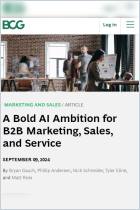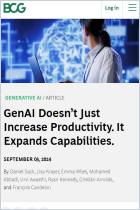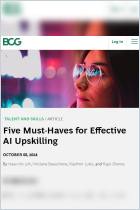GenAI is poised to disrupt software development radically, yet few companies are harnessing its potential and seizing productivity gains. A useful deep dive from Boston Consulting Group reveals the factors behind the gap between “intentions and adoption,” while providing software companies with a framework to embrace the dramatic change ushered in by GenAI. Moving into the future, the companies that experiment with GenAI, embracing a culture of learning, adaption, and innovation, will be the ones that turn the potential challenges associated with this emerging technology into potent opportunities.
GenAI has the potential to dramatically transform software development — but few are adopting it.
Many software companies are struggling to harness GenAI’s potential to drive productivity gains. Only 30 percent of software firms around the world have adopted GenAI tools (according to research from Stack Overflow and Alteryx), while Boston Consulting Group research reveals that among three-quarters of early adopters, less than half of developers are taking advantage of GenAI tools. Several factors can explain the pervasive “gap between inventions and adoption.” For one, the extent to which developers see GenAI-driven productivity gains correlates with their experience level: Midlevel developers who possess the experience to use and adapt GenAI code see the greatest gains; Junior developers see some gains, but their lack of experience can make it difficult for them to discern high-quality code from low-quality code; And finally, senior developers see fewer gains. For some, deep familiarity with code languages can make routine disruptions unappealing.
GenAI’s effectiveness varies across contexts and is dependent on the technology stack developers...
Pranay Ahlawat, Julie Bedard, Sankalp Damani, Ben Feldman, Elizabeth Lucero, Abhishek Samdaria, and Geoffrey Sipperly are professionals with Boston Consulting Group.

























Comment on this summary or Comenzar discusión